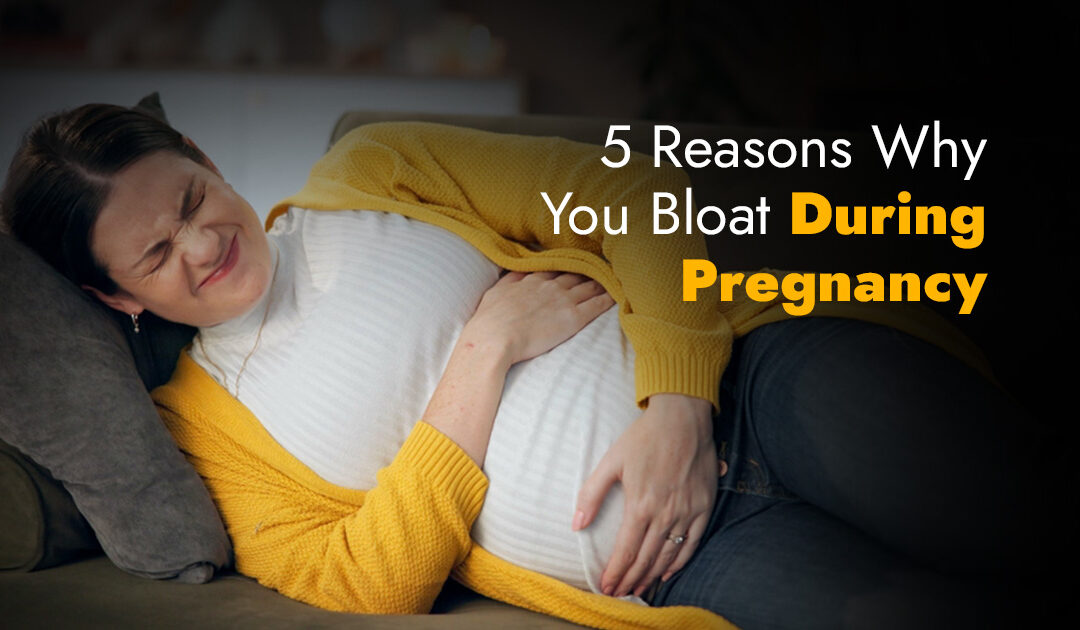Are you feeling like there’s a balloon in your belly during your pregnancy? Are you finding difficulty in getting rid of it? This blog talks about 5 main causes why you might bloat during your pregnancy. Firstly, bloating when you’re expecting is an extremely common symptom. Multiple factors can come into play to explain why you experience extreme bloating during your pregnancy. Those factors may include hormonal fluctuations, changes in digestion, and bowel movements. While constipation, diarrhea, and irritable bowel syndrome (IBS) may be considered as probable causes as well, healthcare professionals also indicate bloating to be the result of a functional bowel disorder (FBD).
Most pregnant women complain of bloating. According to a report on pregnant women, 49% of them indicated bloating over nine months.
What Are the Causes of Bloating?
Bloating in pregnancy is an extremely common complaint that most expectant mothers have. Most often, a combination of factors; finding the root cause of the problem can help you cope with it in better ways. The probable causes may consist of:
1. Hormonal Imbalance: Pregnancy hormones, specifically progesterone, play an important role in relaxing the muscles of your gastrointestinal system. The relaxation slows down food movement in your digestive system and causes accumulation of gas and bloating or the impression of fullness. In addition, progesterone controls the sphincter muscle relaxation at the lower esophagus level. This may further lead to heartburn and reflux, which once again could be a reason for bloating.
2. Increased Blood Flow: As a natural response, your body understands that it needs to enhance blood volume during pregnancy in an effort to take care of the developing fetus. This excessive amount of blood flow can lead to fluid retention in your body, which then causes bloating, especially in the abdominal region.
3. Uterine Pressure in the Stomach: Since your uterus grows bigger to accommodate the growing baby, it starts applying pressure on your digestive system. This pressure could then delay digestion, leading to feelings of fullness and bloating, especially after meals.
4. Changes in Diet: Pregnancy may require you to make dietary adjustments, as there is a huge difference in what you prefer to eat and can digest. Foods you enjoyed eating in the past may now cause bloating or gas in you. You may make the following dietary adjustments to reduce bloating and gas during your pregnancy:
- Gassy Foods: Inculcating foods such as beans, lentils, vegetables in the cruciferous group (broccoli, cauliflower), and carbonated drinks in your diet may cause bloating.
- High-Fat Foods: Fatty foods take a longer time to digest and might cause bloating.
- Dairy Foods: Some women experience discomfort and bloating after consuming dairy because they are lactose intolerant, which might be at its peak during their pregnancy.
- Constipation: Constipation is another common pregnancy symptom that makes women feel bloated. The hormones mentioned above, in addition to this, may affect the muscles in your intestines, slowing down the movement of waste through your body. This adds to constipation, which makes you feel bloated and uncomfortable.
Other factors also play an important role in bloating. In some cases, emotional stress can be the cause of improper digestion, leading to bloating and other gastrointestinal symptoms. Besides that, food intolerances can be caused in some pregnant patients and are the cause of bloating and other related symptoms. Some medications, like iron supplements, can lead to constipation and bloating.
But it is important to recall that you are supposed to consult your gynecologist if bloating is persistent or severe, especially if you get any symptoms, including pain, vomiting, or fever. This might assist your gynecologist in giving you a proper diagnosis and treatment after finding out the cause.

